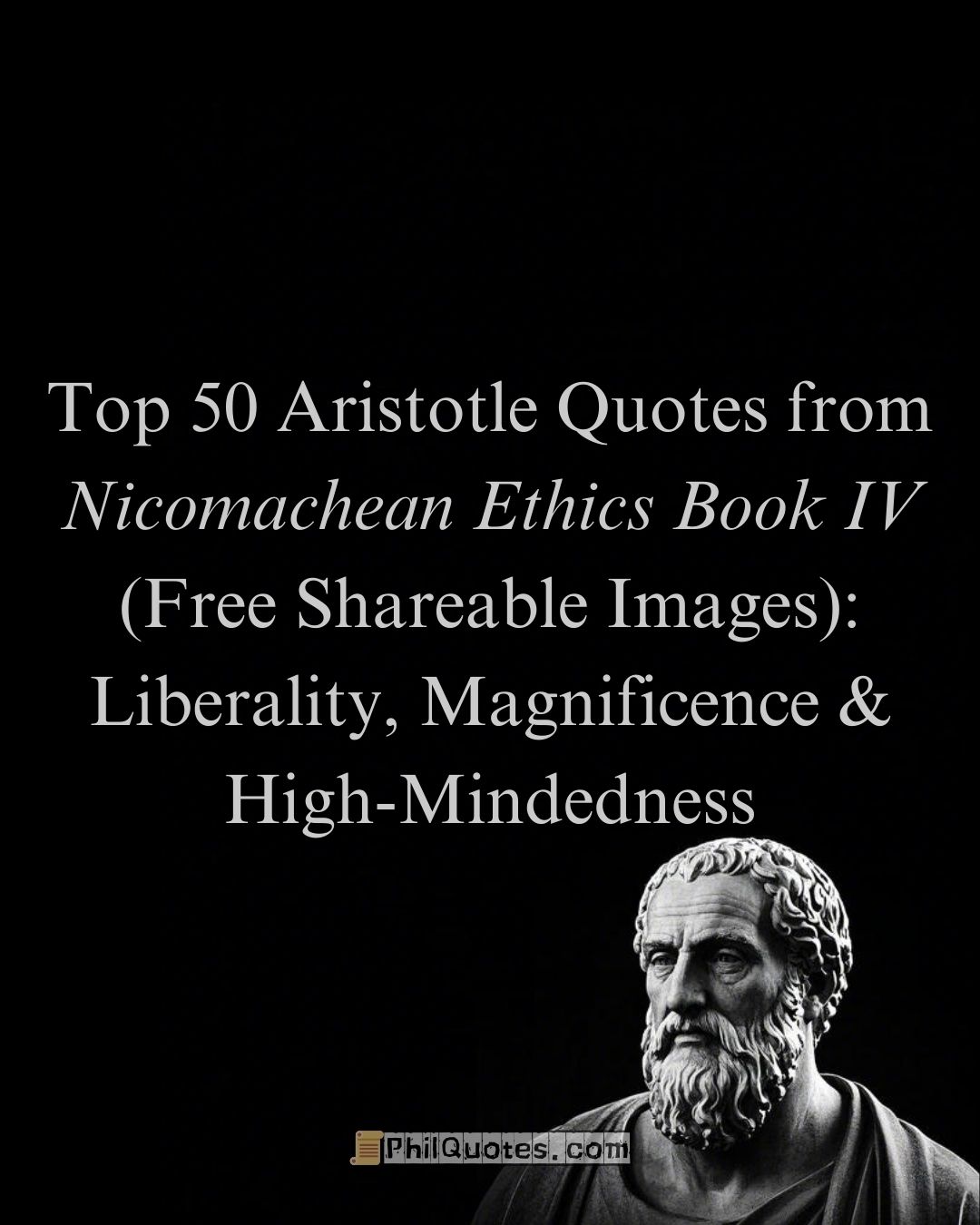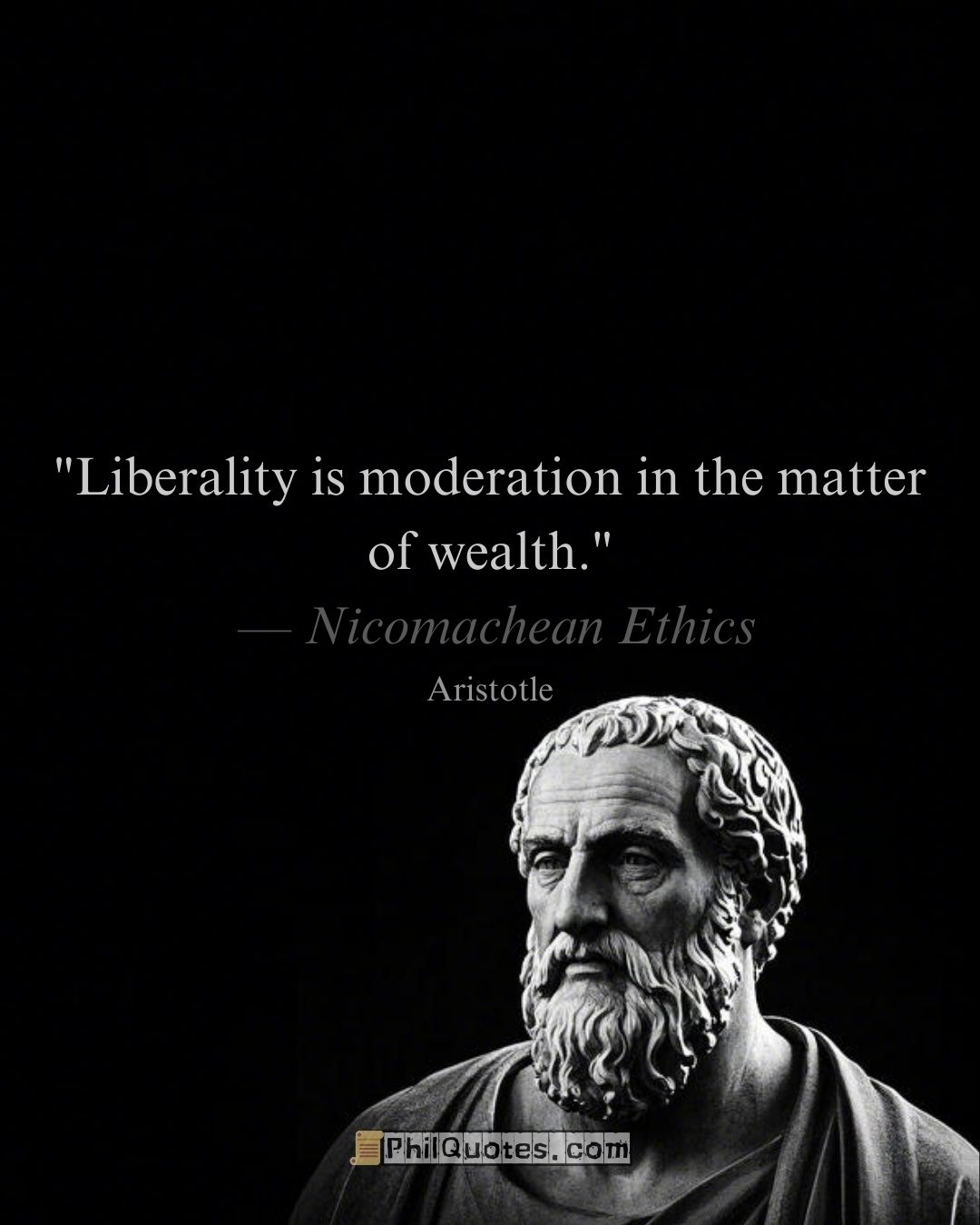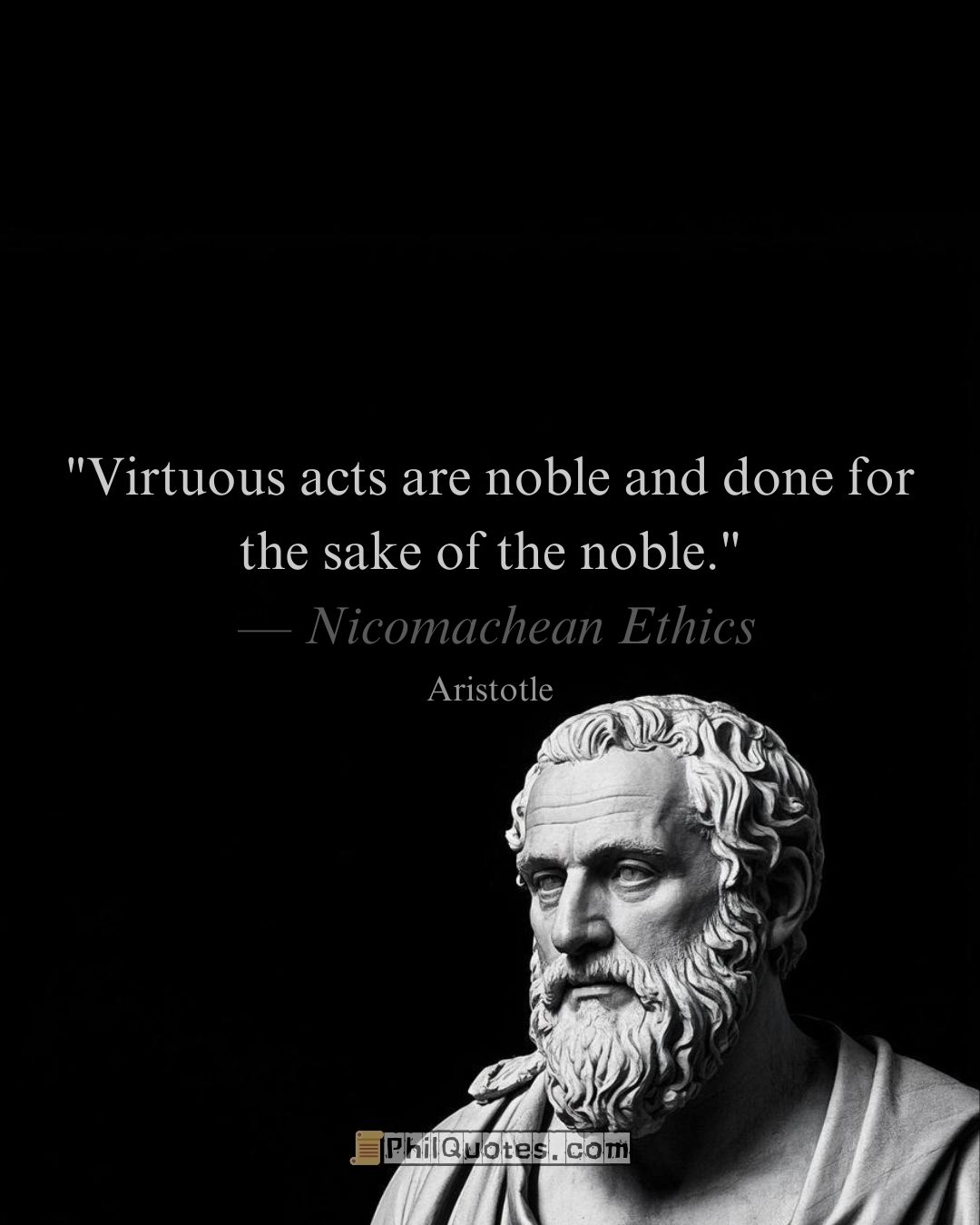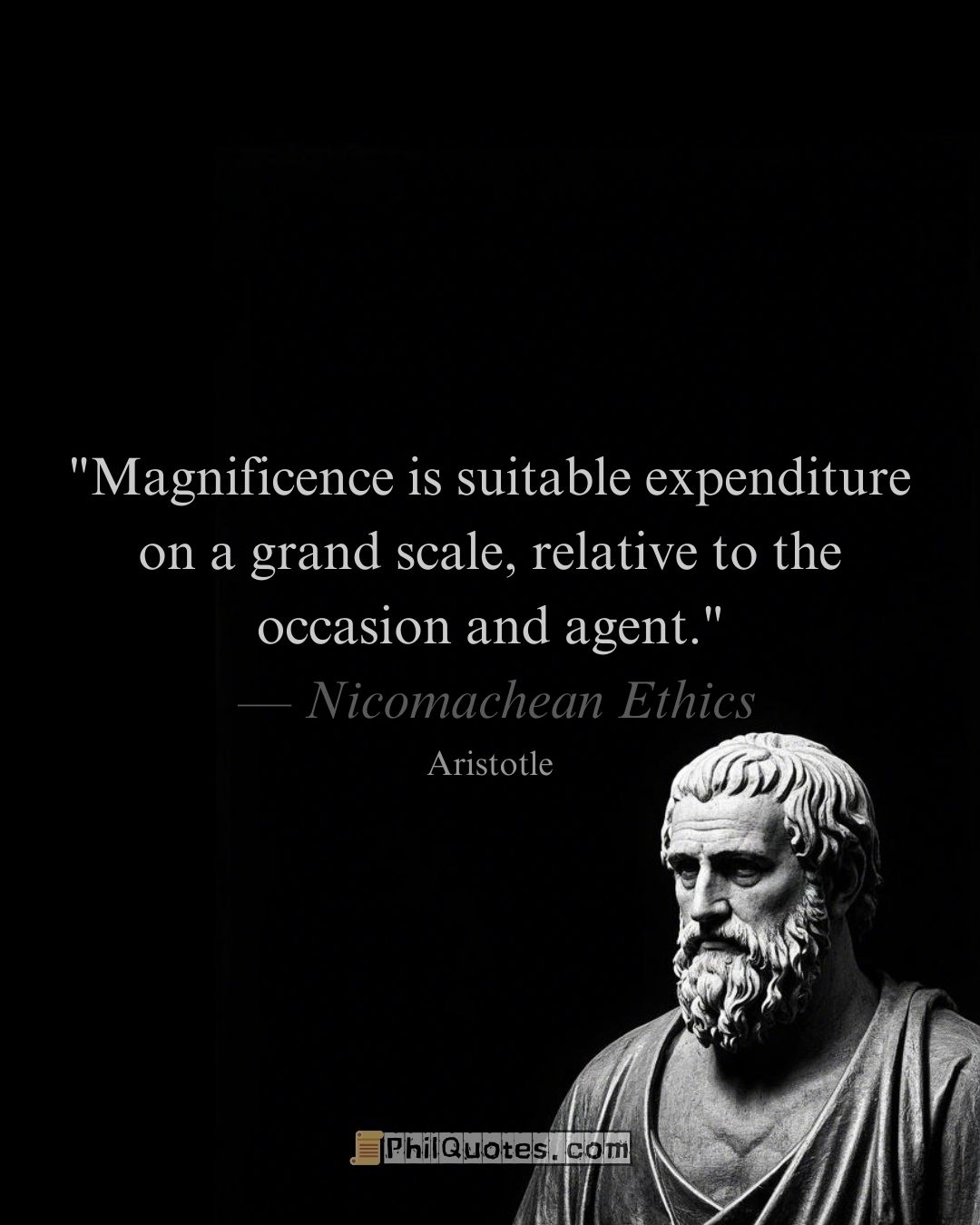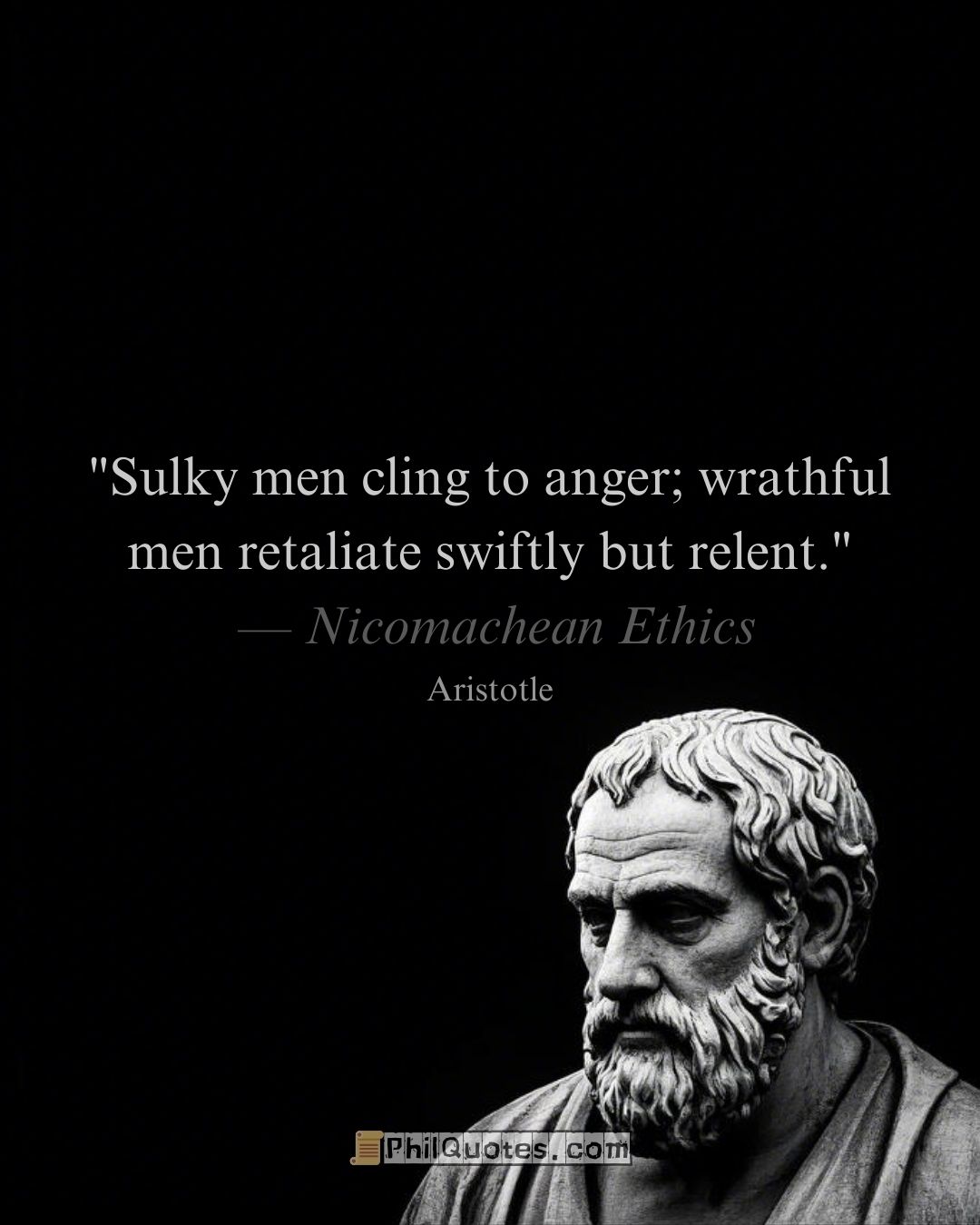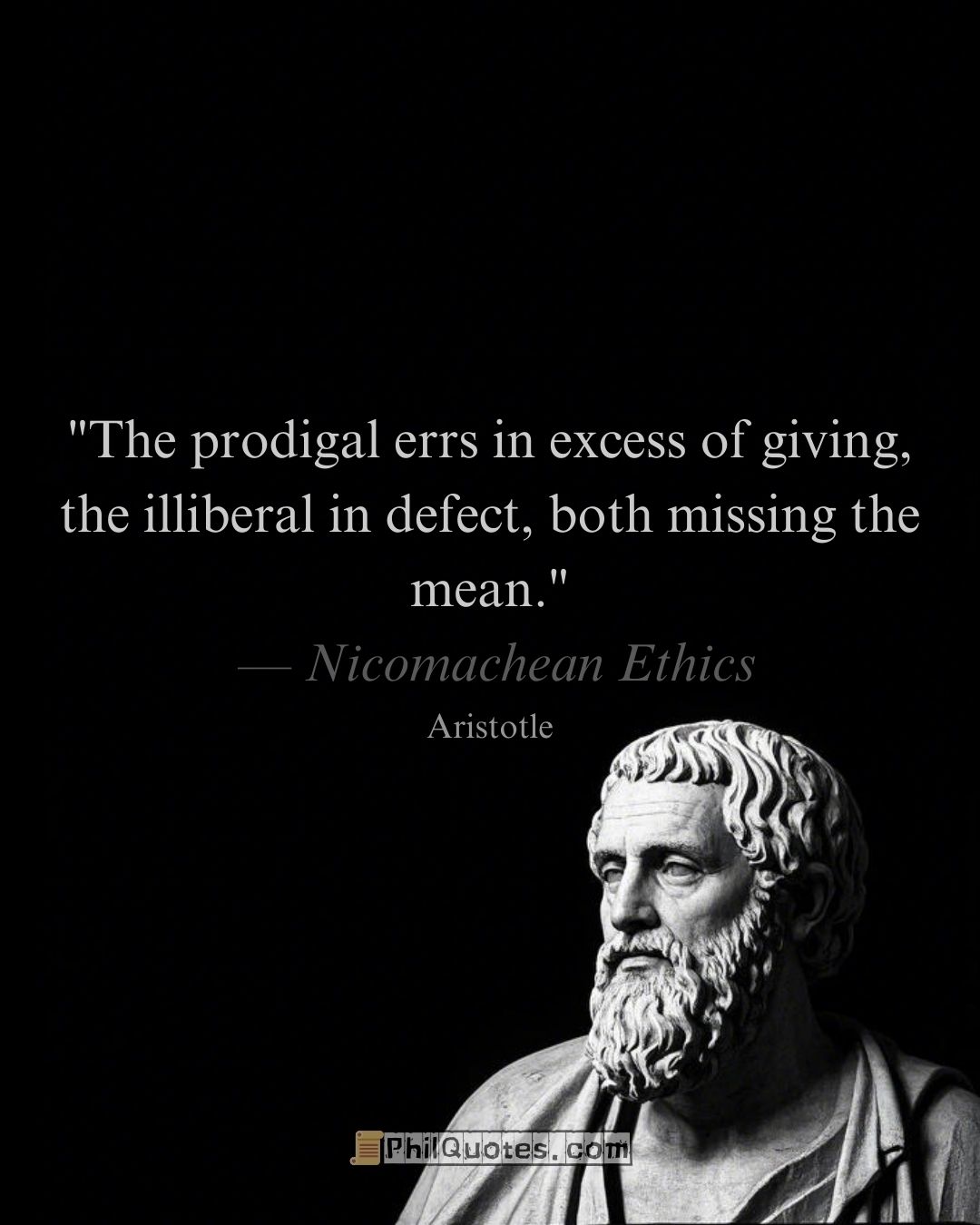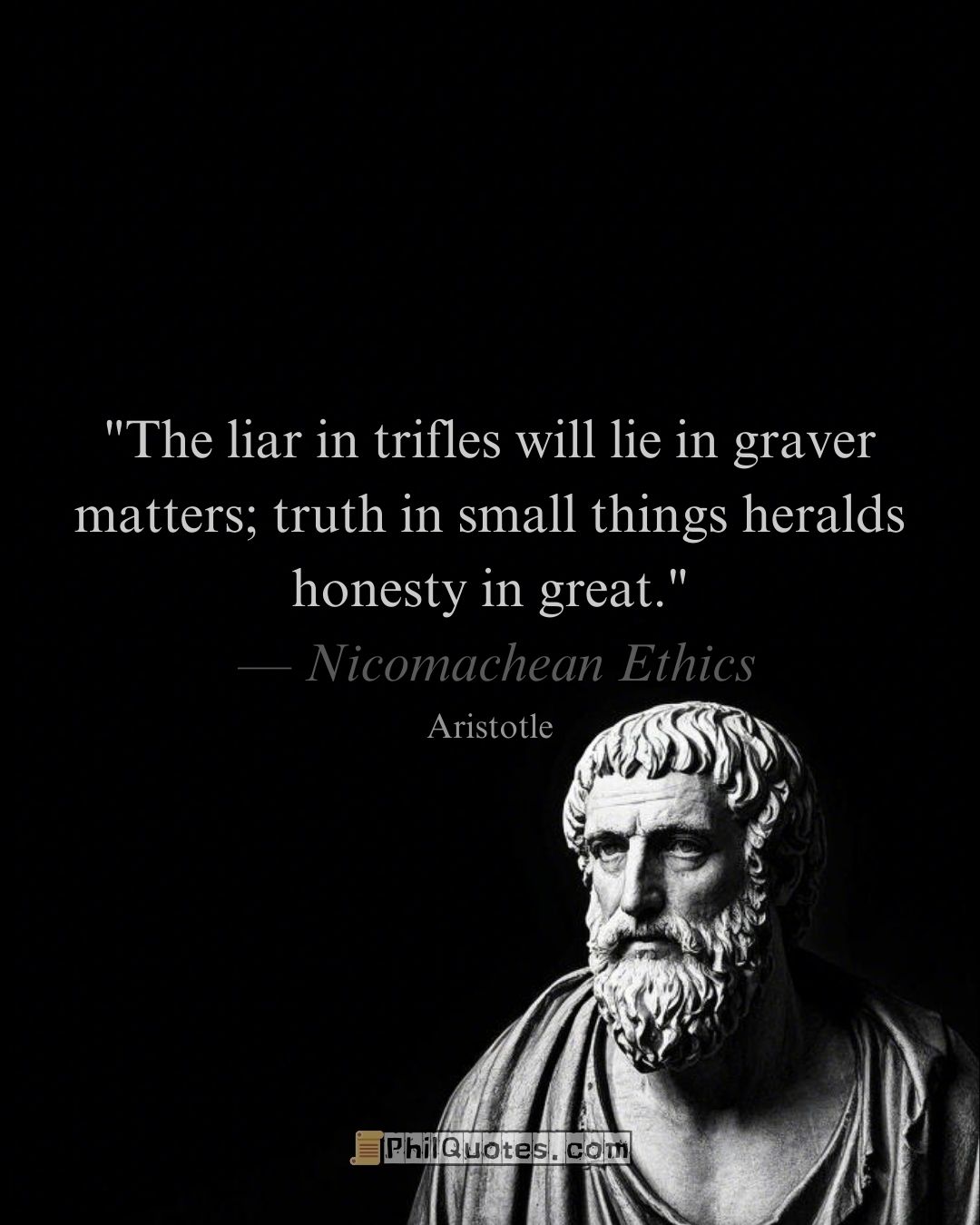Discover the essence of Aristotelian wisdom with PhilQuotes ’ curated collection of 50 profound quotes from Aristotle’s *Nicomachean Ethics *, focusing on virtues like liberality, magnificence, and high-mindedness. In this deep dive into Book IV of his seminal work, Aristotle dissects the golden mean of character—exploring how moderation defines ethical excellence, whether in managing wealth, expressing anger, or pursuing honor. Each quote, meticulously translated by W.D. Ross, is paired with a unique visual on PhilQuotes.com , offering both philosophical insight and artistic inspiration.
At PhilQuotes , we bridge ancient philosophy and modern life, making timeless ideas accessible through quotes, analyses, and imagery . Aristotle’s teachings on virtues—such as liberality’s balance between prodigality and illiberality, or magnificence’s blend of grandeur and purpose—remain strikingly relevant today. This post is designed for students of ethics, philosophy enthusiasts, and anyone seeking actionable wisdom to navigate life’s moral complexities. Whether you’re exploring the link between wealth and nobility or the art of gentle anger, these quotes reveal why Aristotle’s ethics still resonate. Bookmark, share, or dive deeper into each concept via our interactive quote galleries at PhilQuotes.com , where philosophy meets visual storytelling.
1. “Liberality is moderation in the matter of wealth.” Nicomachean Ethics , Book IV, Chapter 1 (Translated by W.D. Ross)
2. “Prodigality and illiberality are at once excess and defect in the matter of wealth.” Nicomachean Ethics , Book IV, Chapter 1 (Translated by W.D. Ross)
3. “Illiberality means caring for wealth more than is right; prodigality combines vices of excess and deficiency.” Nicomachean Ethics , Book IV, Chapter 1 (Translated by W.D. Ross)
4. “The liberal man uses wealth best, for he gives and takes with noble intent.” Nicomachean Ethics , Book IV, Chapter 1 (Translated by W.D. Ross)
5. “To give rightly is more distinctive of virtue than to abstain from taking wrongly.” Nicomachean Ethics , Book IV, Chapter 1 (Translated by W.D. Ross)
6. “Virtuous acts are noble and done for the sake of the noble.” Nicomachean Ethics , Book IV, Chapter 1 (Translated by W.D. Ross)
7. “The liberal man gives gladly, for virtuous action is pleasant or painless.” Nicomachean Ethics , Book IV, Chapter 1 (Translated by W.D. Ross)
8. “He who takes from wrong sources is no lover of the noble but a slave to gain.” Nicomachean Ethics , Book IV, Chapter 1 (Translated by W.D. Ross)
9. “The liberal man may exceed in giving, leaving himself too little, for he disregards self.” Nicomachean Ethics , Book IV, Chapter 1 (Translated by W.D. Ross)
10. “Liberality is measured not by the amount given, but by the giver’s character and means.” Nicomachean Ethics , Book IV, Chapter 1 (Translated by W.D. Ross)
11. “Magnificence is suitable expenditure on a grand scale, relative to the occasion and agent.” Nicomachean Ethics , Book IV, Chapter 2 (Translated by W.D. Ross)
12. “The magnificent man spends with artistic judgment, aiming at beauty and nobility.” Nicomachean Ethics , Book IV, Chapter 2 (Translated by W.D. Ross)
13. “Vulgarity exceeds in ostentation, spending improperly to flaunt wealth, not honor the noble.” Nicomachean Ethics , Book IV, Chapter 2 (Translated by W.D. Ross)
14. “The mean man spoils magnificence by petty frugality, lamenting even necessary costs.” Nicomachean Ethics , Book IV, Chapter 2 (Translated by W.D. Ross)
15. “High-mindedness concerns great honors; the high-minded man claims and deserves much.” Nicomachean Ethics , Book IV, Chapter 3 (Translated by W.D. Ross)
16. “High-mindedness is the crown of the virtues, for it enhances them and cannot exist without goodness.” Nicomachean Ethics , Book IV, Chapter 3 (Translated by W.D. Ross)
17. “The high-minded man is slow to trifling action, quick to great deeds, and sparing of his life.” Nicomachean Ethics , Book IV, Chapter 3 (Translated by W.D. Ross)
18. “He who confers benefits is superior; the high-minded man shames to receive, not to give.” Nicomachean Ethics , Book IV, Chapter 3 (Translated by W.D. Ross)
19. “The high-minded man speaks and acts openly, despising dissimulation as slavish.” Nicomachean Ethics , Book IV, Chapter 3 (Translated by W.D. Ross)
20. “Gentleness moderates anger, feeling it rightly: at the right things, toward the right people, and in due measure.” Nicomachean Ethics , Book IV, Chapter 5 (Translated by W.D. Ross)
21. “Sulky men cling to anger; wrathful men retaliate swiftly but relent.” Nicomachean Ethics , Book IV, Chapter 5 (Translated by W.D. Ross)
22. “Hard-tempered men are foes to sociability, inflicting pain for trifling causes.” Nicomachean Ethics , Book IV, Chapter 5 (Translated by W.D. Ross)
23. “In social intercourse, the mean avoids obsequious flattery and contentious rudeness.” Nicomachean Ethics , Book IV, Chapter 6 (Translated by W.D. Ross)
24. “Friendliness resembles virtue, requiring us to please rightly, not for gain or fear.” Nicomachean Ethics , Book IV, Chapter 6 (Translated by W.D. Ross)
25. “The truthful man hates falsehood, confessing his merits without boast or irony.” Nicomachean Ethics , Book IV, Chapter 7 (Translated by W.D. Ross)
26. “Boasters pretend to undeserved honors; the ironical depreciate their worth, yet both err from truth.” Nicomachean Ethics , Book IV, Chapter 7 (Translated by W.D. Ross)
27. “Wit lies in tact: jesting without vulgarity, pleasing without paining.” Nicomachean Ethics , Book IV, Chapter 8 (Translated by W.D. Ross)
28. “The buffoon seeks laughter at any cost; the boor cannot endure mirth.” Nicomachean Ethics , Book IV, Chapter 8 (Translated by W.D. Ross)
29. “Shame is not virtue but a feeling, proper to youth restraining error, unbecoming in age.” Nicomachean Ethics , Book IV, Chapter 9 (Translated by W.D. Ross)
30. “A good man feels no shame, for he does nothing shameful; vile acts alone merit it.” Nicomachean Ethics , Book IV, Chapter 9 (Translated by W.D. Ross)
31. “The prodigal errs in excess of giving, the illiberal in defect, both missing the mean.” Nicomachean Ethics , Book IV, Chapter 1 (Translated by W.D. Ross)
32. “Wealth’s best use lies not in hoarding but in noble giving, the mark of the liberal.” Nicomachean Ethics , Book IV, Chapter 1 (Translated by W.D. Ross)
33. “The liberal man values wealth only as a means to act nobly, not for its own sake.” Nicomachean Ethics , Book IV, Chapter 1 (Translated by W.D. Ross)
34. “Magnificence demands greatness of scale, yet proportioned to the giver and the deed.” Nicomachean Ethics , Book IV, Chapter 2 (Translated by W.D. Ross)
35. “The vulgar confuse costliness with beauty; the magnificent marry expense to elegance.” Nicomachean Ethics , Book IV, Chapter 2 (Translated by W.D. Ross)
36. “High-mindedness scorns honors from the base but accepts them modestly from the good.” Nicomachean Ethics , Book IV, Chapter 3 (Translated by W.D. Ross)
37. “The high-minded man moves slowly, speaks deeply, and acts with measured dignity.” Nicomachean Ethics , Book IV, Chapter 3 (Translated by W.D. Ross)
38. “Gentleness praises anger rightly felt, condemns excess as wrath, defect as servility.” Nicomachean Ethics , Book IV, Chapter 5 (Translated by W.D. Ross)
39. “Social virtue blends truth with pleasantness, shunning flattery and rudeness alike.” Nicomachean Ethics , Book IV, Chapter 6 (Translated by W.D. Ross)
40. “Irony, when not extreme, reflects refinement; boastfulness, a hollow soul.” Nicomachean Ethics , Book IV, Chapter 7 (Translated by W.D. Ross)
41. “The liar in trifles will lie in graver matters; truth in small things heralds honesty in great.” Nicomachean Ethics , Book IV, Chapter 7 (Translated by W.D. Ross)
42. “Amusement’s grace lies in saying what befits a gentleman, sparing others’ dignity.” Nicomachean Ethics , Book IV, Chapter 8 (Translated by W.D. Ross)
43. “Shame’s hypothetical goodness vanishes, for virtue needs no remedy.” Nicomachean Ethics , Book IV, Chapter 9 (Translated by W.D. Ross)
44. “The magnificent expend on public works—temples, sacrifices—honoring gods and cities.” Nicomachean Ethics , Book IV, Chapter 2 (Translated by W.D. Ross)
45. “The high-minded remember benefits conferred, forget those received, to retain superiority.” Nicomachean Ethics , Book IV, Chapter 3 (Translated by W.D. Ross)
46. “Gentle anger, like a skilled physician, heals without wounding.” Nicomachean Ethics , Book IV, Chapter 5 (Translated by W.D. Ross)
47. “Friendship’s mean asks neither to please all nor pain all, but to serve the noble.” Nicomachean Ethics , Book IV, Chapter 6 (Translated by W.D. Ross)
48. “The boaster mimics greatness, the ironical hides it; both miss truth’s golden mean.” Nicomachean Ethics , Book IV, Chapter 7 (Translated by W.D. Ross)
49. “Laughter tests character: the vulgar jest obscenely, the refined with wit.” Nicomachean Ethics , Book IV, Chapter 8 (Translated by W.D. Ross)
50. “The man who is worthy of small honors and deems himself worthy of them is temperate, but he is not magnificent; for ‘magnificent’ implies a greatness of worth, just as ‘beautiful’ implies a certain stature.”
Aristotle’s Nicomachean Ethics reminds us that virtue is a habit, not an accident —a truth PhilQuotes brings to life through this curated collection. As you reflect on liberality’s grace or high-mindedness’s dignity, let these quotes inspire you to seek the golden mean in your own journey. For more philosophical depth, visit PhilQuotes.com , where we transform classical wisdom into engaging, visual-rich content.
Share this post to spark discussions on ethics, bookmark your favorite quotes, or explore our Aristotle quote series for deeper dives. At PhilQuotes , we’re committed to making philosophy relatable—one quote, one image, one virtue at a time. Join our community to stay updated on new content that turns ancient insights into modern guidance. After all, as Aristotle taught: “Excellence is never an accident.” Let PhilQuotes help you make it intentional.
